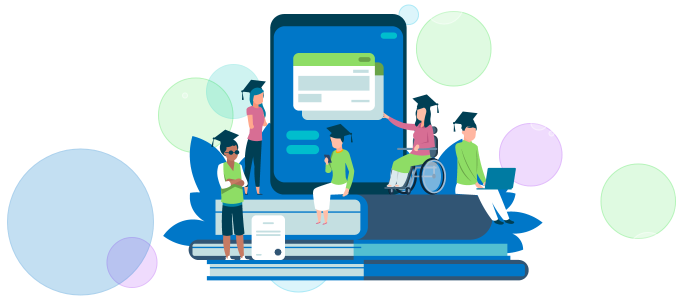Have you started learning about accessibility yet?
Are you learning about accessibility yet? If not, it’s time to start.
From the moment I discovered digital accessibility 6 years ago, I was hooked. I finally found work that made me passionate. Who wouldn’t be excited about making the digital world a better place for everyone? That is exactly what accessibility and inclusion are about, it’s not for a select group of people that “need” it, but for everyone who encounters it.
Things started to change in 2020 with the pandemic. We heard about kids with disabilities trying to learn at home without the extra assistance they received in schools and employees who were suddenly home without all the tools they needed. This put a spotlight on digital accessibility. The number of digital accessibility lawsuits and reports of accessibility issues from users increased, pushing accessibility into the urgent zone. Because of this, more companies have an interest in accessibility in general and sustainable accessibility in particular.
WCAG 2.2 was released fairly recently, enhancing the guidelines for digital accessibility. So not only are accessibility skills in demand but developing accessibility expertise is increasingly straightforward. As technology advances, so will accessibility requirements, creating a more inclusive digital environment. This is the perfect time to start building your skills.
Why accessibility?
In the digital world, there is always some new trend to follow and some new skill to learn, and you can’t jump on every bandwagon. Why pick accessibility? Our Beginner’s Guide to Accessibility provides a good general summary of why accessibility matters and needs to be a priority. If that’s not enough, here are a few more reasons to start thinking about building your a11y skills:
- It will improve the overall quality of your code and your design and content.
- It’s a growing field that will always be needed and will evolve with technology (a LOT like security).
- Worldwide, digital accessibility is legitimately a growing concern. Here is a Google Trends graph of searches for WCAG (the top red line), “a11y”* (the middle yellow line), and “digital accessibility (the bottom blue line):
- Diversity, Equity, Inclusion and Accessibility (DEIA) is easily one of the biggest social and civil issues of our time, and it’s rapidly becoming a major concern in corporate culture. Some analysts say that companies are now putting more budget behind DEIA than compliance!
Start Learning A11y Today!
The Deque Team is passionate about education because making the digital world accessible to everyone of all abilities depends on you. It depends on everyone taking responsibility for doing the work, so we want to make sure you have the tools and the knowledge to do your part.
Deque University (DQU): No matter where you are in your accessibility journey, Deque training will help you thrive and grow. With hands-on experiences, live and self-paced courses, focused learning paths, and the world’s best online resources, the courses are designed to take you from beginner to expert. All built and delivered by the most experienced instructors in the industry, so you can learn in the way that works best for you.
There are courses and tracks that cover:
- Accessibility Fundamentals: Learn what accessibility is and why it matters
- Accessibility Bootcamp: Jump start cross-functional teams
- Web Development track: Courses focused on building web accessibility skills
- Document accessibility: PDF, InDesign, MS Office, and more
- Full curriculum: Learn about the accessibility universe
- IAAP CPACC Certification Prep (where I started!)
I personally used Deque University to help guide my accessibility journey and get my Certified Professional in Web Accessibility (CPWA), which eventually led me to work for Deque.
DQU has over 140,000 learners, and through our Scholarship program, more than 1,200 people with disabilities have received full access to our curriculum. We’ve even had several scholarship recipients go on to become professional accessibility specialists after completing our courses.
Launch a great career, amplify your current skills, or start developing new skills today. Get ahead of the A11y curve!

You are talking about the situation in America, but the same is true in the UK as well. As a freelance a11y contractor and consultant I keep a permanent watch on UK job boards, with WCAG and accessibility as my search terms. I would estimate (though I didn’t take a count back then) that I am seeing 4 or 5 times the number of developer roles asking for accessibility experience, maybe more, than there were just two years ago. UK companies are waking up to their responsibilities in this area even though we unfortunately do not have the same legal pressures that you have over there!
Thanks, Guy! That’s a really interesting piece of data. It’s great to see that more companies on both sides of the Atlantic are starting to pay attention to accessibility.